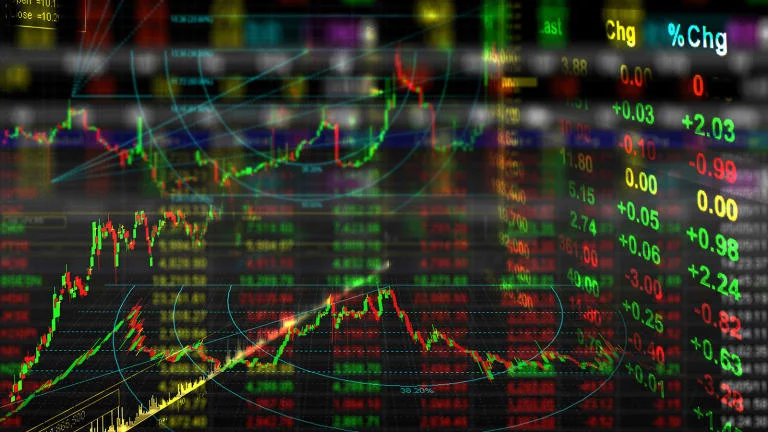The market indices are flashing green, hitting highs that suggest widespread prosperity. The S&P 500 just crested 6,740, and the Nasdaq is charting its own new territory above 22,900. On the surface, the `us stock market` looks robust, even invincible. It’s shrugging off a federal government shutdown in Washington as if it were a minor inconvenience, a piece of background noise.
But look closer. This isn't a story of broad-based strength. It's a story of concentration. The entire edifice of today's market is balanced on the point of a pin, and that pin is labeled "Artificial Intelligence." The US stock market keeps setting records as AI excitement keeps building. The `latest stock market news` isn't about industrial output or consumer spending; it’s about which tech giant whispered a new partnership into existence. We're witnessing a rally, yes, but one so narrow it could pass through the eye of a needle. And the data from yesterday’s trading session provides a perfect, almost clinical, case study of the distortion.
Let's dissect the engine driving the `stock market today`. Advanced Micro Devices (AMD) stock exploded, soaring 23.7% in a single session. The catalyst? A deal for OpenAI to use its chips. But the structure of this deal is what should give any clear-eyed analyst pause. As part of the arrangement, OpenAI—the customer—stands to own up to 160 million shares of AMD if it hits certain milestones.
Think about that for a moment. This isn't a simple transaction of goods for cash. It’s a symbiotic, self-referential partnership where value is passed in a circle. It’s like a homeowner paying a contractor to build an extension, but instead of cash, the contractor gets a percentage of the house's future appreciation. The arrangement ensures both parties are existentially tied to the same narrative of perpetual growth.
Now, add the third player to this drama: Nvidia. The undisputed king of AI chips saw its stock slip 1.1% on the AMD news. Why? Because Nvidia previously announced its own landmark partnership, a $100 billion investment in OpenAI. So, the company that is bankrolling OpenAI is now watching its investment partner with its chief competitor, which in turn props up the competitor’s stock while its own dips. I've looked at hundreds of these filings, and this particular entanglement of capital and competition is unusual. It’s less a free market and more a closed ecosystem, a terrarium where three entities are essentially trading value among themselves, and the public market is simply placing bets on who has the upper hand this week.

This isn't a traditional value-creation cycle. It’s a narrative-creation cycle. What happens when the narrative is no longer compelling? Or when one of these giants decides the partnership is no longer favorable? The concentration of influence means a single corporate decision at OpenAI (now valued at a staggering $500 billion) can swing tens of billions of dollars in market cap for its "partners" overnight. Is that a sign of a healthy market or a dangerously fragile one?
While the AI drama played out, the rest of the market seemed to be operating in a different reality. Comerica jumped 13.7% after being acquired by Fifth Third Bancorp in a straightforward, old-economy M&A deal. Verizon fell 5.1% after a CEO shakeup. These are the kinds of moves that are supposed to matter—fundamental changes in corporate structure and leadership. Yet, they were footnotes. The day's volume and attention were consumed by the AI story.
Perhaps the most telling signal is the market's complete indifference to the U.S. government shutdown. The conventional wisdom on Wall Street is that these shutdowns are temporary political theater with minimal economic impact. The market is betting this time is no different. But this calm dismissal stands in stark contrast to markets abroad. In Japan, the Nikkei surged 4.8% on the selection of a new, pro-stimulus leader. In France, the CAC 40 fell 1.4% after a prime minister resigned. Those markets are reacting, quite logically, to political events that have tangible economic consequences.
The U.S. market, however, has its blinders on. It’s as if traders are sitting in a soundproof room, staring at a single screen flashing `nvidia news` and AI press releases, oblivious to the political discord outside. This divergence is the core discrepancy. The market's record highs are not reflecting a resilient American economy; they are reflecting an obsessive fixation on a single, speculative sector. This isn’t strength; it’s a dangerous lack of diversification in the market’s attention span.
This isn't a bull market in the traditional sense. It's a concentration event. We are not witnessing a tide that lifts all boats, but a geyser that shoots a few chosen vessels sky-high while the rest of the ocean remains relatively calm. The record-setting S&P 500 is being skewed by a handful of mega-cap tech stocks whose valuations are predicated on a future that is far from certain. The risk isn't being spread across the economy; it’s being piled higher and higher onto the same few companies. This isn't an investment; it's a bet on a belief system, and those can evaporate far more quickly than earnings.